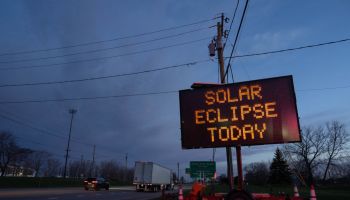In many cities it’s
almost impossible to walk around without
your movements being recorded by surveillance
cameras. In fact, driving anywhere in
Britain means having a picture of your car
and license plate being snapped multiple
times per journey. But what if you were being
tracked from space, by satellite? It
sounds spooky, but it’s now a reality in
some parts of the world. A trial program of
a new speed camera system in Britain
dubbed “SpeedSpike” has led some media
to proclaim it an even deeper descent into a
“Big Brother” society while decrying the
technology as an invasion of privacy. The
Slippery Slope The technology, explains
Andy Howard, head of road safety at U.K.
motoring group AA, is not quite as sinister
as it might sound. “It’s just a normal speed
camera,” he says, but one that is hooked up
to a network of speed cameras that use GPS
satellites to track their locations, rather
than directly tracking a driver’s route.
Every time a car is photographed by one of
the speed cameras, the time is recorded,
and then the system calculates the average
speed between two cameras to determine
whether the driver was speeding. “Theoretically,
you could guard every entrance to a
town and see if anyone averaged 30 mph
inside,” Howard said. “But we don’t think
this is likely.” It would be “mathematically
difficult” to calculate if a motorist has broken
speeding laws if they’d traveled
through multiple speed zones, according to
Howard, like driving from a 45 mph limit to
a 70 mph zone on a highway. The technology
would be most applicable on a long-distance
run along a single highway, say, from
London to Edinburgh. “We already have
‘average-speed’ cameras through roadworks
(construction zones). Cameras snap
your license plate as you go in and as you go
out,” he said. These cameras have been in
service recording driver information since
2000. The only difference is that while
these cameras are connected by wire, the
new cameras would use GPS. “A Bit Iffy”
Though the prospect of cameras that track
speeds by calculating distance over time
has long been discussed in British motoring
circles, the new GPS satellite angle has
caused quite a stir. The responses we garnered
from U.K. motorists when they were
informed of the new satellite tracking experiment
were uniformly negative. This instinctive
recoil strengthened when I mentioned
that a unit of an American company,
Tennessee-based PIPS Technology, is the
one implementing SpeedSpike. PIPS did
not respond to requests for comment. Similarly,
the British government said it does
not comment on trials that are still underway.
Dylan Sharpe, the campaign director
of U.K.-based Big Brother Watch, told
AOL: “We’re very much opposed to more
surveillance. The government now knows
exactly where we’ve been and how much we
drive. ”We’ve had GPS systems, sat-nav
systems, it was only a matter of time before
an agency worked out how to [use] GPS [to]
track cars and their speed.” But Howard
says any data collected by the system and
the transmission of driver information is
regulated by the government, so “if you
have the right guidelines and rules then the
system wouldn’t be inappropriate. “ Support
for regular speed cameras across the
U.K. runs between 69 and 74 percent, according
to AA’s figures. So while there are
undoubtedly concerns over the spread of
this sort of speed camera tracking, it seems
as if the general public — and the media —
are perhaps being just a little myopic on the
issue.
-AOL AUTO












